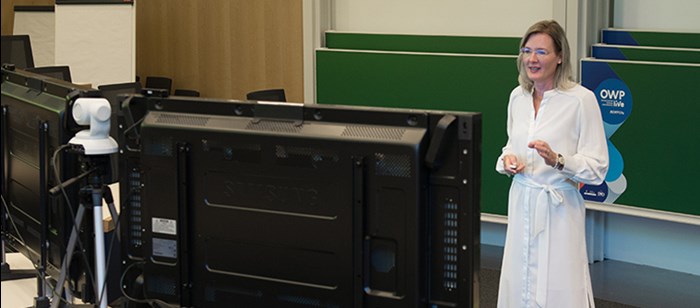In a world blighted by the COVID-19 crisis, “for-benefit” companies are emerging to disrupt the age-old non-profit versus for-profit tussle, says IMD Professor Katharina Lange.
“Exasperated, fragile systems – this is what we are seeing at the moment,” said IMD Professor of Leadership Katharina Lange during a session she moderated, “Leading collective genius – Collaborative mindset for a sustainable future” at the inaugural OWP liVe.
With healthcare on the brink of collapse, economic systems in upheaval and the environment under duress, Professor Lange believes society is due for a correction.
“Looking at it from a leadership angle, we need to find better ways to govern and guide,” pleaded Professor Lange. “We must bring resilience back into these fragile systems that have been stripped in the name of efficiency over the past few decades.”
Professor Lange was joined in her panel discussion by Ann Florini, Professor at the Washington hub of the Thunderbird School of Global Management ASU and incoming board member of the Mars, Inc./Wrigley Economics of Mutuality Foundation, together with John Davison, CEO of Zuellig Pharma.
The birth of a “for-benefit”culture?
According to Florini, the focus should no longer be on optimizing business models for efficiency. The policy research expert insists that solutions to the world’s problems do exist but require cross-sector collaboration and the involvement of multiple stakeholders from different areas of society.
“There is just one caveat,” Florini said, “this only works if all interests are closely aligned.”
Rather than the traditional profit versus non-profit dichotomy, a new type of organization must emerge – the “for-benefit”. These for-benefits will join the ranks of non-governmental and industry actors in solving the world’s large-scale problems.
By redefining and rearranging shareholder understanding, for-benefit corporations can bridge the gap between doing business and doing good. While this new breed of organization demands a unique regulatory structure, it isn’t necessary for companies to follow a particular legal framework.
“Some companies like Unilever and carpet manufacturer Interface are as focused on caring about impact as they are on the bottom line,” said Florini.
“The social contract between society and business is something that needs to change.”
Mars, Inc, she said, has put real thought into what its role in society should be – and not just about how much money it can extract.
“What is the right level of profit?” Florini questioned. “Companies must consider how what they do creates value for all stakeholders, not just shareholders.”
Is corporations’ number finally up?
But does this spell the end of corporations? Not in the least, said John Davison: “For-profit organizations can very well create value for society.”
The CEO credits his Singapore-based healthcare services company, Zuellig Pharma, for the work it has done to reduce waste and fragmentation in the healthcare industry. Davison said the end result is cost savings as well as greater accessibility to health services.
“This works because business interests – profit— and value creation for society are aligned,” he said. “We can actually measure the outcomes.”
Professor Lange believes that alignment of key interests is indeed the most important factor in creating companies that do business as well as doing good.
“To bring resilience back into our systems, salient leadership capability is necessary,” she stated. “We need to identify the alignment of interest between profit and value creation for society.”
This can only be achieved with real collaboration, insisted Professor Lange: “Our exasperated systems need new ways of governance. We must turn passion into action, create bigger value than our coordination efforts and leave value on the table for society.”
But this value can only be put to good use if resilience is brought back to the fragile systems in place. Altering the prevailing governance model of extracting value and optimizing efficiency is a necessary step in allowing them to regain their buoyancy.
COVID-19, the resilience wake-up call and added value for society
Setting an example for other companies, Zuellig Pharma is a major player in bringing resilience back – specifically to the healthcare systems in Southeast Asia.
“We are creating value for society and for the systems by making healthcare available to more people who need it,” said Davison.
The COVID-19 pandemic has increased demand, putting healthcare systems around the world under extreme pressure. Coupled with the struggle to achieve universal health coverage, Davison declared the situation a ticking “health care time bomb”.
He then took on the important topic of counterfeit drugs – more than one million people die each year from unknowingly taking them – and how Zuellig Pharma has played its part in eliminating their sale.
“Counterfeit medicines are a problem for hospitals, doctors and patients,” Davison explained. “Government responsibility is the issue here, as they must protect citizens from harm.”
To combat this problem, the company has developed an app to allow anyone to check the authenticity of a product by scanning a code on their mobile phones. If the product is not genuine, alarms are raised across the supply chain.
“We broadened our approach to value creation from pure product distribution to take in to account the interests of multiple stakeholders,” said Davison.
Summarizing the session, Professor Lange reemphasized that collaboration is the only way forward. Quoting Gerry George, the dean of SMU’s School of Business, she said: “Turn passion into action.”
That action can mark the beginning of a move toward rebuilding a resilient society – for the people and the planet.


